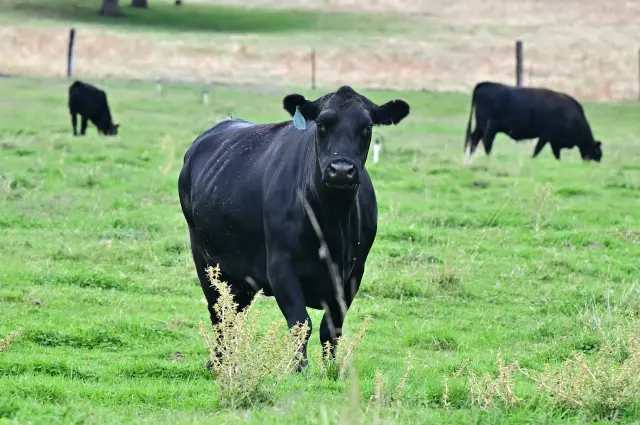-
Dodgers’ Clayton Kershaw Explains Powerful Show of Support for Alex Vesia - 18 mins ago
-
Trump’s Call to Resume Nuclear Testing After Decades Revives a Cold War Debate - 20 mins ago
-
Nationwide Fish Recall Prompts Warning to Customers - 54 mins ago
-
California animal rights activist convicted in chicken caper - 56 mins ago
-
Gov. Gavin Newsom Turns California Election Into Possible 2028 Platform - about 1 hour ago
-
Josh Allen Admits Reality of Playing Patrick Mahomes, Chiefs - about 1 hour ago
-
Little Word of a TikTok Deal Out of Trump-Xi Meeting - 2 hours ago
-
Austin Reaves Accomplishes Lakers Milestone Not Seen Since Kobe Bryant - 2 hours ago
-
Knife-wielding suspect fatally shot inside a Ralphs grocery store in Santa Barbara - 2 hours ago
-
Older New Yorkers Brace for Food Stamp Cuts: ‘I’m Just Praying’ - 3 hours ago
Republican Rebellion Over Trump’s Argentina Beef Imports Grows
A growing number of Republican lawmakers are rebuking President Donald Trump’s decision to expand low-tariff beef imports from Argentina, warning it will hurt U.S. ranchers already struggling with high costs and tight supplies.
A group of 14 House Republicans led by House Ways and Means Chair Jason Smith of Missouri and Trade Subcommittee Chair Adrian Smith of Nebraska wrote to Agriculture Secretary Brooke Rollins and U.S. Trade Representative Jamieson Greer on Wednesday urging the administration to explain the plan and to secure “equivalent market access for U.S. beef exports” before granting Argentina wider entry to the U.S. market.
“We encourage the administration to ensure that any adjustments to Argentina’s tariff-rate quota or inspection regime be contingent on verified equivalency and reciprocal market access for American beef,” the lawmakers wrote.
Newsweek has contacted the White House via email for comment.
Why It Matters
The White House argues that expanding Argentina’s quota, roughly quadrupling it to 80,000 metric tons, will help ease record U.S. beef prices. But ranchers and industry groups say the move could flood the market with foreign meat while offering little relief to consumers.

What To Know
Ranchers’ anger has translated into political pressure: several Republican senators and farm-state House members have privately and publicly pressed administration officials in recent days, and at least one closed-door Senate meeting put Vice President JD Vance under sustained questioning about the policy, according to The New York Times.
“The point I made is we ought to work with our ranchers rather than import more,” GOP Senator John Hoeven of North Dakota told the outlet.
“It was good that a number of people spoke up about their concerns for beef producers in their states,” Nebraska Senator Deb Fischer told The New York Times. “It was good that the vice president heard that.”
The Department of Agriculture (USDA) outlined a plan to rebuild the domestic cattle herd and provide new support for U.S. ranchers. Rollins said on Fox Business’s Mornings with Maria last Wednesday that the administration is focused on helping consumers and producers simultaneously.
“There is frustration on both sides,” Rollins said. “And I was with the president yesterday and he is very, very frustrated because [of] everything he’s done to cut taxes, to bring down costs.”
U.S. beef prices have increased amid a shrinking cattle herd, drought-related feed shortages, and high processing costs. Analysts note that imports are unlikely to lower steak or roast prices, affecting mainly lean trimmings for ground beef.
According to USDA data compiled by the Federal Reserve Bank of St. Louis, the average price of ground beef rose to about $6.32 per pound in September, an increase of 77 cents since January.
The beef dispute has been amplified by earlier trade decisions that frustrated U.S. farmers. Trump’s tariffs on Chinese goods and a recent $20-billion currency swap involving Argentina contributed to a shift of Chinese soybean purchases toward South American suppliers, particularly Argentina and Brazil, and away from U.S. growers. That loss of sales has already angered many Midwestern soybean farmers, who see the administration’s Argentina outreach as benefiting a competitor while leaving American exporters disadvantaged.
What People Are Saying
White House spokesperson Anna Kelly told Newsweek: “President Trump pledged to protect America’s ranchers and deliver economic relief for everyday Americans. The administration is accomplishing both by expanding beef imports from Argentina to lower consumer prices in the short term while rolling out a new USDA initiative that will support ranchers and expand cattle herd sizes to keep prices lower in the long term.”
Georgia Representative Marjorie Taylor Greene, a Republican, told Tucker Carlson’s show that the plan is “a punch in the gut to all of our American cattle ranchers.”
Republican Senate Majority Leader John Thune told reporters on October 23: “We’re paying close attention to it, and we’ve been in touch with the White House, Department of Agriculture, U.S. trade rep on all this stuff, trying to figure out where it’s headed,” Thune said.
GOP Representative Adrian Smith of Nebraska said in a statement: “Policy and statements which unduly influence and undermine the domestic cattle market threaten our domestic food security and are not helpful.”
“There is frustration on both sides,” Agriculture Secretary Brooke Rollins said on Fox Business. “I was with the president yesterday and he is very, very frustrated because [of] everything he’s done to cut taxes, to bring down costs.”
The National Cattlemen’s Beef Association wrote in a post on X: “The reality is that ranchers’ success is driven by their own hard work. America’s cattlemen and women operate in one of the most competitive marketplaces in the world. U.S. cattle producers are proud to provide the safest, highest-quality beef on earth. We simply ask that the government not undercut them by importing more Argentinian beef in order to manipulate prices.”
Trump wrote on Truth Social last week that ranchers “who I love, don’t understand that the only reason they are doing so well, for the first time in decades, is because I put Tariffs on cattle coming into the United States, including a 50% Tariff on Brazil.”
What Happens Next
Republican dissent suggests pressure on the White House to either narrow the policy, attach export concessions for U.S. beef, or increase domestic measures to increase the U.S. supply.
Source link



















